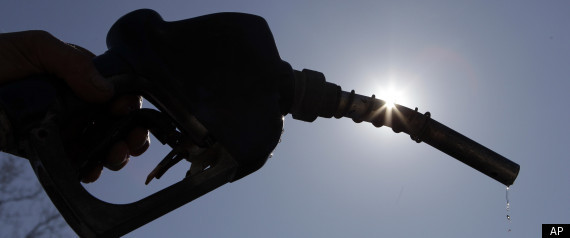Sunday, 20 March 2011
Brent Crude Oil Tops $116 After UN Approves Military Action In Libya
SINGAPORE (Reuters) - Brent crude jumped by more than $1 to $116 on Friday on fears of rising geopolitical tension in the oil-rich Middle East and North Africa, after the United Nations approved military action to contain Libyan leader Muammar Gaddafi.
Front-month Brent rose $1.10 to $116 by 3:25 a.m. ET, after earlier touching a one-week high of $116.50, while U.S. crude for April rose $1.49 to $102.91.
Japan's strongest earthquake on record a week ago sent fear coursing through global financial markets, raised concerns of reduced demand from the world's third-largest oil user and triggered a drop in Brent to a three-week low near $107 two days ago.
High oil prices and Japan's disaster may pose a twin blow to the nascent economic recovery. Brent is less than $4 away from a 2-1/2-year high of almost $120 reached on February 24, when an uprising against Gaddafi shut down at least two-thirds of Libya's oil output.
"The initial shock in the markets with regards to the negative impact on growth as well as the short-term effect on Japanese demand is now subsiding and people are turning to the medium- and long-term implications of the earthquake on oil demand and turmoil intensifying in the Middle East," said Yingxi Yu, a Singapore-based commodities analyst with Barclays Capital.
as well as the short-term effect on Japanese demand is now subsiding and people are turning to the medium- and long-term implications of the earthquake on oil demand and turmoil intensifying in the Middle East," said Yingxi Yu, a Singapore-based commodities analyst with Barclays Capital.
The involvement of foreign forces "could prove to be a further escalation of the situation in Libya. It seems difficult that this will speed up the flow of Libyan oil back into the world market," Yu added.
The U.N. Security Council, meeting in emergency session on Thursday, passed a resolution endorsing a no-fly zone to halt government troops now around 100 km (60 miles) from Benghazi. It also authorized "all necessary measures" -- code for military action -- to protect civilians against Gaddafi's forces.
French diplomatic sources said military action could follow within hours, and could include France, Britain and possibly the United States and one or more Arab states; but a U.S. military official said no immediate U.S. action was expected.
Libya's pre-crisis oil output of about 1.6 million barrels per day (bpd) is unlikely to reach international markets even if Gaddafi holds on to power, controls and repairs oil infrastructure and resumes shut-in production, analysts said.
"To go from condemning Gaddafi to buying his oil in short order would be politically difficult, and while sanctions would be financially painful for consuming countries, it would be an easier option if OPEC fully fills the gap," JP Morgan oil analysts headed by Lawrence Eagles said in an e-mailed note.
Saudi Arabia and other member countries of the Organization of the Petroleum Exporting Countries (OPEC) have increased production this year, partly to offset the loss of Libyan barrels. That has also eroded spare capacity, leaving a thinner cushion to compensate for potential further disruptions.
BAHRAIN UNREST
Earlier this week, Bahraini forces cracked down on Shi'ite protesters demanding reform by the Sunni monarchy, which drew criticism from key Bahraini and Saudi ally the United States and also from Iran.
The involvement of Saudi Arabian troops and other forces from Gulf Cooperation Council (GCC) countries in Bahrain also raised the stakes of confrontation in the island state, which lies less than 100 kilometers from the hub of the Saudi oil industry.
"Events over the past week suggest that something profound has changed in the dynamics of the region," Yu said.
"The relation between the U.S. and Saudi Arabia has been the key foundation of the oil market for many decades. Recent events seem to be creating some stress on the relationship."
Saudi Arabia's King Abdullah will address the nation on Friday to issue a number of decrees, the royal court said in a statement released by the top oil producer's state news agency late on Thursday.
"It's absolutely crucial for the oil market to watch for potential changes in the Saudi leadership," Yu from Barclays said. "It's the only country that holds a meaningful amount of spare capacity and the disruption in Libya has already put some stress on it."
Saudi Arabia has mostly avoided the wide unrest that toppled rulers in Egypt and Tunisia and spread to other Gulf countries, but there are pockets of dissent in the absolute monarchy, which has no elected parliament. Most demonstrations have been in the east of the kingdom, where the world's largest oil reserves are located and home to a large Shi'ite population.
"Day of rage" protests planned for a week ago in Saudi Arabia failed to materialize or fizzled quickly amid a widespread police presence, but social media networks had initially also called for a second day of protests on March 20.
(Source: http://www.huffingtonpost.com/2011/03/18/oil-military-libya_n_837453.html)

This post was written by: HaMienHoang (admin)
Click on PayPal buttons below to donate money to HaMienHoang:
Follow HaMienHoang on Twitter





0 Responses to “Brent Crude Oil Tops $116 After UN Approves Military Action In Libya”
Post a Comment